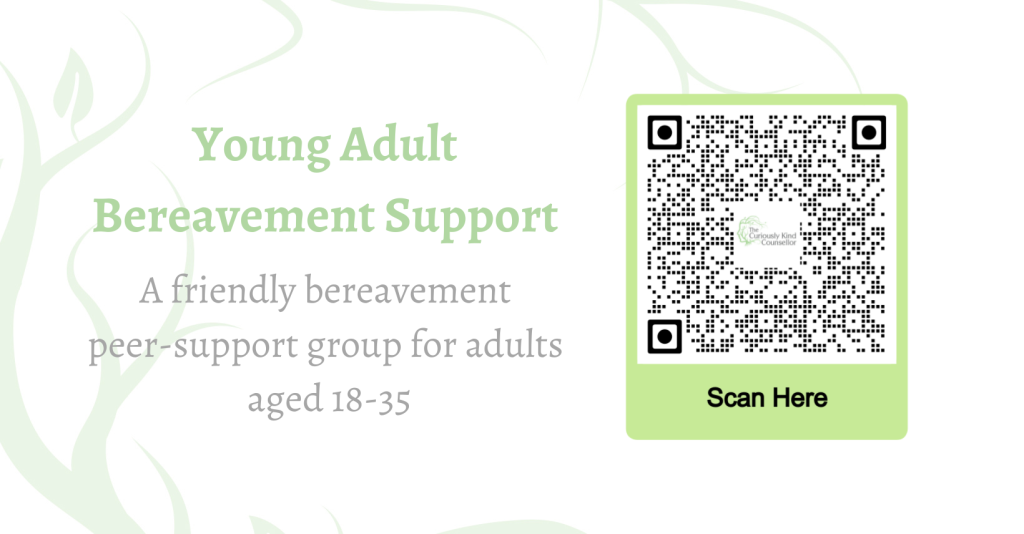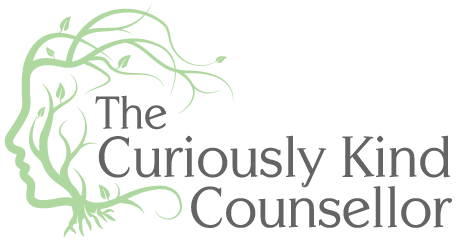Grief, Bereavement & Loss
Grief, bereavement and loss is an area of specialist interest in my counselling work. From my own personal experiences and my work with clients, I understand that grief can feel like an incredibly lonely time, especially when it rearranges our contact list. When we add the messy, exhausting, and often, conflicting feelings on top, we can end up feeling overwhelmed and as if we’re going crazy. Understanding that these all-consuming feelings are a normal part of the process, can go someway to relieving that initial distress and feeling of vulnerability. It’s also important to acknowledge that we can experience feelings of grief in other losses; e.g. a relationship breakdown, a life transition such as retirement or redundancy.
When talking about loss, I’m often asked what the point of counselling is, if it cannot bring a loved one back or change something that has happened. I understand this question because as much as I would love to say I can fix the unfixable – I can’t. However, what I can offer, is a space for your grief to be seen and heard. A space for you to be open and honest about your grief – every messy, complicated, contradictory feeling and thought is welcome. When a loved one dies, it can feel so life-shatteringly big that we wonder how we keep putting one foot in front of the other. It can feel so overwhelming, that we wonder how the world around us is still going on as normal, whilst we feel it is physically hard to breathe. Counselling can help offer you a space to process your experience of loss so it feels less all-consuming. It’s a space where, over time, you can grow around your loss and learn to live alongside it.
Sometimes family and friends can offer well-meaning platitudes and cheerleading but this can leave us feeling dismissed, hurt and/or questioning whether we are normal to feel the way we do or whether our experiences are normal. It can feel as if our grief is a problem to be resolved, rather than the natural and normal process that we all experience after a loss.
Feelings of grief can also occur prior to a loss; for example, if a loved one receives a terminal illness diagnosis or is diagnosed with an incurable condition. This ambiguous loss can feel equally confusing, messy and complicated, as we feel bereft; yet, our loved one is still currently with us. However, this is an entirely normal response and these thoughts and feelings can be just as intense and difficult, as those you experience after a death. You may experience anxiety, fear and/or panic and if your feelings of anticipatory grief last for a prolonged period of time, you may begin to feel emotionally and physically exhausted.
There is no right or wrong in grief – it is as unique as the individual and many factors can contribute to our grieving process. The feelings, thoughts and changes in behaviour we can experience are vast and it’s impossible to name all of them here. Some of the most common feelings include; anger, sadness, despair, panic, guilt, shame, relief, shock, depressed, anxiety, feeling numb and loneliness/isolation. We can also experience poor concentration, an increased need to be busy and/or hyper-vigilance. Some of these may resonate with you and others may not – you may have experienced something totally different – whatever your thoughts, feelings and experiences – there is no right or wrong and although counselling cannot fix it, I truly believe in the power of allowing your grief to be witnessed and giving your grief a voice.
Support After A Suicide Attempt
Alongside supporting people bereaved by suicide, I also work with individuals who are affected by a loved one’s attempted suicide. The effect of a suicide attempt can be devastating and when you first hear that someone you know has tried to take their own life, you may feel a whole range of conflicting emotions – shock, guilt, confusion, anger, hurt, grief or even numbness – whatever your response, how you feel is ok.
In the immediate aftermath, it is important to ensure the person who has attempted suicide receives appropriate medical care. If they are discharged from hospital without receiving an appropriate mental health assessment, call your local crisis team. If they continue to be in immediate danger to themselves or others, call 999 – as long as it is safe to do so, stay with them until appropriate support arrives and remove any obvious means of suicide they may use. As difficult as it is, try and remain calm and keep them talking by asking non-judgemental questions.
It’s important to be aware that it’s normal for life to feel different for a while and you may experience feeling fearful, ashamed, isolated or distressed. If you are close to the individual, you may find yourself helping them in their recovery and there are lots of resources available online that can guide you through this. However, it’s also important that you have sufficient support around you too – recovery for all involved can be emotionally and physically exhausting.
Whilst you may be focused on fighting for specialist support for your loved one, counselling can also offer you a space to process your feelings, make sense of your experiences and alleviate the distress you may be feeling.

Young Adult Bereavement & Loss
Bereavement and loss in young adulthood can be an even more complex experience. During a period of identity formation and navigating change, loss can add to already heightened feelings of instability; increasing feelings of anxiety, fear and loneliness – particularly if we do not have close friends or peers who have experienced something similar.
The Young Adult Bereavement Support Network is a safe online space, hosted on a social media platform for you to connect with others of a similar age who understand and can relate to your experiences. It is the first group of its kind to be hosted by a qualified mental health professional and you are very welcome to contribute as much or as little you would like. Its aim is to offer you an inclusive, peer-supported space where you can be honest about your grief; hopefully helping to reduce feelings of isolation and loneliness.
